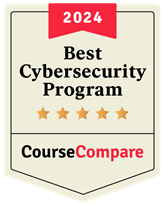CCTB will not be accepting new student intakes during the 2026 calendar year. This planned pause allows us to focus on supporting currently enrolled students and to undertake institutional planning initiatives.
Program information remains available on our website for reference. Updates regarding future intakes will be shared as they become available.
For any specific inquiries, please contact learn@canctb.ca.
The Cybersecurity Risk Management with Co-op program is designed to provide students with a comprehensive understanding of information, network and computer vulnerabilities. Through a combination of theoretical knowledge and practical skills, students will learn to make ethical decisions regarding system vulnerabilities and develop organizational cybersecurity programs. They will also gain hands-on experience in monitoring and analyzing logs and alerts from various technologies across multiple platforms, including IDS/IPS, end-point protection, servers and workstations.
This program covers a broad range of technology topics to provide learners with a strong foundation in understanding cybersecurity from various technological perspectives. The curriculum is designed to be highly relevant to the current cybersecurity landscape, ensuring that students are well-equipped to address cybersecurity challenges in diverse environments. Additionally, the program emphasizes hands-on learning and real-world applications, allowing students to develop practical skills that are directly applicable to cybersecurity roles.
Studying cybersecurity risk management will prepare students for a range of roles, such as an applications analyst, systems implementation manager, network systems engineer, systems security analyst, computer analyst, systems security planner, internet systems administrator and network support technician.
This program is well-suited for individuals seeking to launch their careers as cybersecurity analysts. It offers a comprehensive curriculum that provides students with the essential IT skills needed to excel in the fast-paced and opportunity-rich cybersecurity sector. By equipping students with a strong foundation in cybersecurity principles and practical skills, the program prepares them to succeed in various roles within the field.

The Co-op experience placement represents 50% of the overall program duration (1220 hours). You will get the opportunity to apply your newly acquired skills within the industry through paid work experience.
DESIGNATED B.C. PRIVATE TRAINING INSTITUTIONS REGULATORY UNIT & Shield Design mark is a certification mark owned by the Government of British Columbia and used under licence.


At CCTB, our mission is to empower students with top-tier training, enabling them to stand out in today's competitive job market. Our meticulously designed curriculum is crafted to align with your career aspirations and delivered via cutting-edge industry tools. Immerse yourself in a dynamic learning environment that mirrors real-world business practices, ensuring your readiness for the professional realm.
Furthermore, CCTB is committed to providing comprehensive career orientation, guidance and continuous employment assistance. Throughout your educational journey, you will acquire practical skills tailored to industry demands and receive personalized support to secure employment in your chosen field. Our commitment extends beyond graduation, as we strive to offer ongoing support to facilitate your successful integration or re-entry into the workforce.
Enrolling in the Cybersecurity Risk Management with Co-op program will equip you with skills applicable to various roles. Some positions to consider upon completing the program include:
NOCs: 21220
CIP: 43.0404
Standard
| Weeks | Terms | |
| Academic | 52 Weeks | 4 Terms |
| Term Break | 27 Weeks | - |
| Internship Break | 28 Weeks | 2 Terms |
| *Reading Break | 4 Weeks | - |
| Co-op Placement | 56 Weeks | 4 Terms |
| Total | 167 Weeks | 10 Terms |
*Reading breaks are short academic breaks (1-2 weeks) built in each academic term.
Shortened
| Weeks | Terms | |
| Academic | 52 Weeks | 4 Terms |
| Term Break | 18 Weeks | - |
| Internship Break | - | - |
| *Reading Break | 4 Weeks | - |
| Co-op Placement | 42 Weeks | 3 Terms |
| Total | 116 Weeks | 7 Terms |
*Program Duration for StudentAid BC Applicants
The course starts with an overview of modern PC components and operating systems, focusing on computer administration, maintenance, monitoring and troubleshooting. Students will learn to install and configure desktop computers and devices in a business environment, covering topics like OS architecture, file management, BIOS/UEFI, virtual machines, software management and data protection. Networking and security essentials are also included.
Next, students will learn to install and configure Windows Server 2016 as a networked enterprise operating system. This includes setting up Active Directory, domain name services (DNS), dynamic host configuration protocol (DHCP) and virtualization services.
This course introduces students to the fundamentals of computer networking technologies, covering basic network configuration and management. Topics include the OSI model, TCP/IP protocol suite, IPv4/IPv6 addressing and subnetting, cable mediums, routing and switching, wireless technologies, data flows, connectivity troubleshooting and basic network device configuration.
Students will gain hands-on experience using network simulation software to design, configure and troubleshoot LAN/WAN networks and network devices. Advanced networking concepts such as VLANs, Inter-VLAN routing, IGP, OSPF, STP, network security, cloud computing, basic network programmability and automation will also be covered.
In this course, students will learn the essentials of front-end web development, covering HTML5, CSS3, Bootstrap and JavaScript. They will create responsive and interactive websites that are compatible with mobile and tablet devices. Starting with HTML5, students will build a basic website structure and layout.
They will then use CSS3 to add responsive design elements, including selectors, combinators, the box object model, positioning, animations and advanced layouts using CSS Grid, Flexbox and Bootstrap. Finally, students will use JavaScript to manipulate the Document Object Model (DOM), creating dynamic website features and performing basic form validation.
This course is an introduction to programming using the Python programming language where learners will develop the foundational skills to create procedural and object-oriented applications. Students will become proficient at using and implementing fundamental programming concepts, including basic language syntax, operators, flow-control, lists and tuples, functions, dictionaries and sets, I/O operations, program modules, database connections, object-orientation, generators and lambda expressions. The learning outcomes of this course will set a strong foundation for students to pursue more intermediate to advanced programming courses.
This course provides a comprehensive exploration of JavaScript programming, starting with intermediate concepts such as advanced control flow, arrays, functions and objects, with a focus on manipulating the Document Object Model (DOM). Students will then progress to advanced topics like HTTP and asynchronous programming.
In the second part of the course, students will delve into server-side JavaScript programming technologies, including Node.js, Express.js, NPM and MongoDB. They will learn to design, create and deploy a full-stack CRUD-based application, gaining practical experience in building dynamic web applications from the front end to the back end.
This hands-on database course focuses on practical exercises to teach students the fundamentals of modeling and designing relational database schemas. Using enterprise data modeling and mapping tools, students will learn key concepts such as technical requirements analysis, relationship identification, entity mapping, data normalization and validation.
Moreover, students will gain proficiency in interacting with relational database systems through the SQL (Structured Query Language) programming language. By the end of the course, students will be equipped to perform intermediate-level database queries with confidence.
This course provides a comprehensive introduction to the Linux operating system, covering a wide array of topics essential for understanding its functionality and administration. Students will explore the underlying operating system architecture, gaining insights into command line interface navigation, device and filesystem management, networking fundamentals, common administration practices and bash shell scripting.
Additionally, students will delve into common server administration tasks, learning how to deploy, configure and maintain various enterprise services. These services include but are not limited to SSH for secure remote access, web servers such as Apache and NGINX, SQL servers like MySQL, application servers and version control systems.
This course provides a comprehensive introduction to the software development lifecycle (SDLC) and various development models, such as Agile and Waterfall. Students will learn the concepts and methodologies used by software teams throughout the entire software development process.
Students will learn to analyze business and technical requirements, create high-level technical design documentation, develop and execute test cases and manage their work using project management frameworks. The course includes a segment on high-level system design, where students will use object-oriented design (OOD) to identify program classes and create a domain model. They will also use the Unified Modeling Language (UML) to document their design.
In the software testing part of the course, students will practice different types of software testing, including unit testing, feature testing, usability testing, regression testing, smoke testing and user acceptance testing.
This course provides a comprehensive introduction to the fundamental concepts of information security and the protection of organizational assets. Students will explore the standard operations and administration of enterprise computer systems, gaining an understanding of the information stored within these systems. They will then apply these core concepts in a simulated security operations center environment, developing a framework for implementing security awareness training in both public and private settings. Through practical exercises and real-world examples, students will acquire the knowledge and skills necessary to effectively manage and secure information in a variety of organizational contexts.
This course delivers a comprehensive introduction to the foundational concepts of cybersecurity. Students will explore the history of cybersecurity, tracing the evolution of threats and defense strategies. Various types of cyber-attacks, including malware, phishing and DDoS attacks, will be studied, providing insights into the motives behind these threats. Additionally, students will analyze current cybersecurity issues in the 21st century, such as data breaches, ransomware and insider threats. Through engaging case studies and real-world examples, students will cultivate a profound understanding of the challenges and complexities of cybersecurity in today's digital landscape.
This course provides a comprehensive overview of cybersecurity incidents and the criteria for logging them. Students will gain insight into the entire process of monitoring and documenting critical cybersecurity events, including the analysis of both internal and external information. Additionally, the course will address strategies for efficiently sharing this information with management. Through hands-on exercises and real-world examples, students will acquire practical skills in incident response and learn how to communicate cybersecurity information effectively to stakeholders.
This course offers a comprehensive exploration of incident management and security information and event management (SIEM) tools, with a focus on Splunk. Students will develop a deep understanding of the occurrence of incidents and effective management using Splunk as a SIEM tool.
The curriculum covers various aspects of incident detection and security investigation utilizing Splunk, providing insights from the perspective of a security operations center (SOC) analyst. Students will delve into the advanced features of Splunk, learning how to leverage them to enhance security monitoring and response capabilities.
Additionally, the course guides students on the effective use of Splunk to gather and analyze security information, along with creating professional documentation based on insights derived from the tool. Through practical exercises and hands-on experience, students will cultivate the skills necessary to utilize Splunk effectively in a professional cybersecurity environment.
This course provides a comprehensive exploration of cybersecurity attacks, offering students an in-depth understanding of the techniques employed in executing these attacks. Students will delve into the intricacies of the threat landscape, gaining insights into tracing the origin of a threat.
Furthermore, the course covers the eight phases of threat intelligence, providing students with the knowledge and skills necessary to effectively identify, assess and respond to cyber threats. Through practical exercises and real-world examples, students will develop a holistic understanding of cybersecurity attacks and strategies for mitigating them.
This course provides a comprehensive overview of cybersecurity incident response at local, national and global levels. Facilitated by experienced security professionals, students will gain practical insights through hands-on labs and projects, exploring the strategies and methodologies used to respond to cybersecurity incidents effectively.
The curriculum delves into various aspects of incident response, covering incident detection, analysis, containment, eradication and recovery. Students will learn to apply these principles in real-world scenarios, preparing them to confidently handle cybersecurity incidents.
Additionally, the course explores specific areas of incident response, such as application security and email security incidents. Students will delve into the common threats and vulnerabilities associated with these areas, developing skills to mitigate risks effectively. Practical exercises and case studies enable students to apply their knowledge to real-world cybersecurity challenges.
This comprehensive course offers students an in-depth understanding of Splunk's searching and reporting capabilities. Students will learn to harness Splunk's powerful searching and reporting commands, along with its interactive Pivot tool, to generate detailed reports and dashboards.
Through a series of scenario-based examples and hands-on tasks, students will develop the ability to create intricate searches, reports and charts. They will explore advanced features such as data models, pivot tables and visualization options, empowering them to analyze and present data effectively.
By the course's conclusion, students will possess the skills and knowledge necessary to maximize Splunk's capabilities, enabling them to proficiently create insightful reports and dashboards tailored to various business needs.
This course is crafted to empower students with the knowledge and skills essential for excelling in cybersecurity interviews — a pivotal step in pursuing a career in one of the most dynamic and rapidly growing industries in technology. Students will acquire a comprehensive approach, encompassing crucial steps before, during and after an interview to significantly enhance their prospects of securing a position in cybersecurity.
Prior to the interview, students will be equipped with effective preparation strategies, including thorough research on the company and the specific role, understanding common cybersecurity interview questions and honing their responses through practice. Throughout the interview, students will master strategies for presenting themselves professionally, highlighting their skills and experiences and effectively articulating their passion for cybersecurity. Post-interview, students will learn the art of appropriate follow-up, showcasing their sustained interest and professionalism.
This course integrates theoretical knowledge with practical exercises, fostering the development of confidence and skills necessary to navigate the cybersecurity interview process successfully. By the course's conclusion, students will be thoroughly prepared to secure a cybersecurity job and embark on a fulfilling career in this dynamic and exciting field.
Language proficiency requirements are admission requirements and may not be waived by either the institution or the student.
Students must be in possession of one of the English Language Equivalencies as described in the CCTB Admissions Policy:
.
We acknowledge that the territories on which CCTB and its campus are situated are the traditional, ancestral and unceded territories of the xʷməθkʷəy̓əm (Musqueam), Sḵwx̱wú7mesh (Squamish) and Sel̓íl̓witulh (Tsleil-Waututh) Nations. We thank them for having cared for this land since time immemorial, honour their graciousness to the students who seek knowledge here, and iterate our dedication to valuing the ongoing contributions of Indigenous peoples and communities.